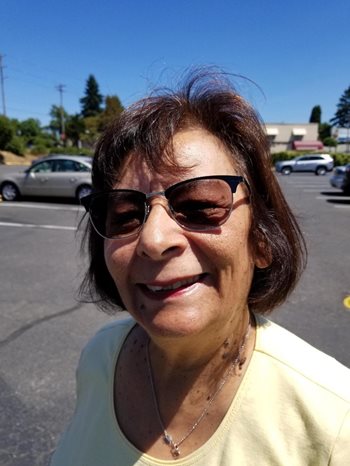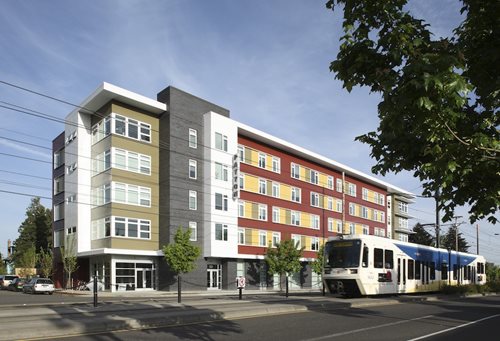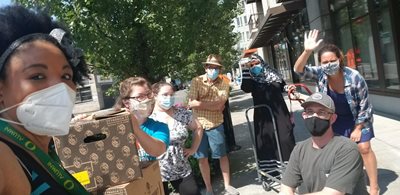At REACH Community Development, a NeighborWorks network organization in Portland, Oregon, residents began the pandemic by controlling what they could. They wore masks and kept a proper social distance. They worked and when they couldn't, they filed for unemployment.
But as spring continued, some residents were struggling to pay their rent, relates Mary Lucero, community manager for Patton Park and McCuller Crossing, two apartment buildings run by the nonprofit. She began looking for ways REACH could help. Funds were available from the state and the federal government, but not everyone was eligible for that support. A grant from NeighborWorks America, made possible with the help of the Wells Fargo Foundation, filled in some of the gaps as the pandemic wore on.
 One of the residents able to take advantage of that grant was a resident who worked as a mover, Lucero recalls. He worked much less during the pandemic. "People weren't moving," explains Lucero. He applied for funds from the state but missed out on the second round of funding. When he learned in December 2020 that he had cancer and needed to begin treatment, his worry about rent mounted. Lucero says a grant from the Rental Resilience Fund helped him catch up on rent. "It was a big relief for him to get this rental assistance," she says.
One of the residents able to take advantage of that grant was a resident who worked as a mover, Lucero recalls. He worked much less during the pandemic. "People weren't moving," explains Lucero. He applied for funds from the state but missed out on the second round of funding. When he learned in December 2020 that he had cancer and needed to begin treatment, his worry about rent mounted. Lucero says a grant from the Rental Resilience Fund helped him catch up on rent. "It was a big relief for him to get this rental assistance," she says.
Nationwide, people in the service industry were especially hard hit by the pandemic, particularly those who worked at restaurants. "People here were concerned about being able to pay their rent," Lucero says. "They were afraid of being evicted. But we said we would work with them. We basically reassured them that everything was going to be okay; that we'd work through it."
"It's been helpful to keep an open line of communication between community managers and residents," relates Lauren Schmidt, fundraising and public relations manager for REACH. "It's really important to have that trusted relationship between the site team and residents. Being able to have a conversation and help them understand, that's made it much easier to reassure folks."
Lucero's role has changed over these past months, as she's spent more time focused on the barriers residents may have to accessing government funds. She does more paperwork, helps match residents with funding, and keeps a sharp eye on what's available. She also keeps an eye on deadlines.
"It's very challenging for residents," she says. "Funding is being funneled in so many different ways. There's always someone asking me, ‘Where can I get assistance?' It's become part of my job to find it."
 By June 2021, REACH had secured $1 million in rental assistance for over 430 residents. There are still more gaps to fill: the nonprofit has pending requests for approximately $758,000 for an additional 300 households. "Every bit of funding makes a difference," says Schmidt.
By June 2021, REACH had secured $1 million in rental assistance for over 430 residents. There are still more gaps to fill: the nonprofit has pending requests for approximately $758,000 for an additional 300 households. "Every bit of funding makes a difference," says Schmidt.
The Rental Resilience Fund wasn't the first only funding REACH received from NeighborWorks during the pandemic. Early on, the nonprofit received flexible funding to help with urgent needs. Those needs included personal protective equipment, cleaning supplies and emergency compensation. The funding also helped with technical needs as staff moved to a remote work environment and supported residents with essential items. Later in the pandemic, NeighborWorks issued another round of funding to help organizations like REACH that were stretched thin, but that kept their focus, as they always do, on their residents.
07/27/2021

